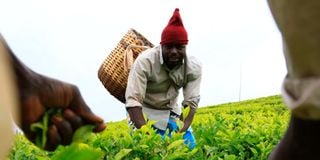Tea farmers brace for low bonus on market glut

A farmer plucking tea. Some 620,000 small scale tea farmers lost over Sh600 million in dubious transactions by top officials at the Kenya Tea Development Agency.
What you need to know:
- Indications suggest that farmers might see a reduction in their bonuses compared to the previous year due to ongoing market challenges.
- The situation is compounded by high production costs and loans taken to sustain factories during periods when tea sales were sluggish.
A persistent glut at the Mombasa Tea Auction following high green leaf production occasioning low prices could lead to a decrease in this year's annual bonuses for small-scale tea growers.
The Kenya Tea Development Agency (KTDA), which manages 54 factories and serves 680,000 small-scale tea farmers, is expected to announce its bonuses—also known as the second payment—early this month (September).
Indications suggest that farmers might see a reduction in their bonuses compared to the previous year due to ongoing market challenges.
The situation is compounded by high production costs and loans taken to sustain factories during periods when tea sales were sluggish.
Reports indicate that inter-factory loans, rather than commercial loans, have been a common practice in the industry, exacerbating financial strain.
For the financial year ending in June, KTDA is anticipated to release bonus results in September and disburse payments in October.
Last year, small-scale tea growers received a total of Sh 44.15 billion in bonuses. This was part of a cumulative payment of Sh 67.7 billion, with Sh23.55 billion allocated for monthly green leaf payments, compared to Sh62.88 billion in 2022.
The tea sector saw a 7.6 percent increase in total payments to farmers in 2023, with a 17.6 percent rise in earnings per kilogram, but experienced a 9 percent drop in green leaf production.
In 2021, Kenya’s total tea earnings, including those from privately owned factories and multinationals, were Sh136 billion. This rose to Sh138 billion in 2022 and Sh140 billion in 2023.
Agriculture Principal Secretary Paul Ronoh noted that tea production in 2023 reached 570 million kilograms, up from 538 million in 2022.
This increase is attributed to favorable rainfall, government fertilizer subsidies, and improved farming practices.
“A total of Sh2 billion has been allocated for fertilizer subsidies this year, up from Sh1.4 billion last year, which is expected to boost production,” said Dr Ronoh.
The government has procured 97,000 metric tons of fertilizer, compared to 88,000 metric tons last year, to support tea production.
However, the industry is grappling with a tea glut at the Mombasa auction, where 100,000 metric tons of Kenyan tea are reportedly stuck in warehouses.
Some of this tea has been returned to the auction floor up to 32 times according to PS Ronoh.
“The government is addressing this issue with stakeholders, including brokers, to prevent future occurrences. We have already sold over 45,000 metric tons of the outstanding stock and expect the remainder to be cleared soon,” Dr Ronoh added.
To enhance earnings, the government is advocating for a repeal of the Tea Act, of 2020, which currently mandates that all tea must be sold through the Mombasa Tea Auction.
“We propose that KTDA factories with direct market access be allowed to sell their produce directly, bypassing the auction. This will help improve market efficiency and farmer earnings,” said Dr Ronoh at the Tiraga factory in Bomet last week.
KTDA officials, including Chairman Enos Njeru, Vice Chairman Erick Chepkwony, and Tea Board of Kenya (TBK) CEO Willy Mutai, emphasize the importance of high-quality tea production to secure better returns. “Quality control is crucial. We must ensure that all tea meets high standards to command premium prices globally,” said Mr Njeru.
At an induction training in Mombasa for 300 KTDA zonal directors, officials stressed the need for improved quality from leaf plucking to processing.
“We are auditing both KTDA-managed and private factories to ensure adherence to quality standards, such as the 'two leaves and a bud' requirement,” stated Mr Mutai.
KTDA has also been conducting awareness programs in tea-producing counties to keep farmers informed about market demands.
“We aim to be a leader in both tea production and quality, which will help expand market reach and increase earnings,” added Mr. Chepkwony.
A recent meeting with Governors Hillary Barchok (Bomet) and Erick Mutai (Kericho), along with KTDA zonal directors and Members of the County Assemblies (MCAs), highlighted concerns about the expected drop in bonuses.
“Factories in our counties must uphold high standards to avoid contributing to the market glut,” Dr. Mutai stated then.
Professor Barchok emphasized the role of agricultural extension officers in educating farmers on best practices to boost tea production and guarantee high-quality standards.
Tea sector leaders also disclosed that some factories have struggled to sell their produce at the Mombasa auction, leading to reduced prices.
Mr Philiph Langat, the Zone Nine Chairman, reported that recent sales occurred at lower prices due to the backlog.
Kapkoros Tea Factory Chairman David Korir stressed the need for improved quality control.
“Substandard tea from private factories is affecting the market. The Tea Board of Kenya should address this issue and crack down on substandard practices,” he said.
Zonal directors Samson Menjo, Cheruiyot Baliach, Simon Mutai, and Benard Koech committed to working with stakeholders to improve tea production practices and increase farmer incomes.
In response to market demands, KTDA factories are shifting towards producing specialty teas, such as the orthodox variety, which commands higher prices.
This contrasts with Kenya’s traditional reliance on black CTC tea, which has served established markets in Pakistan, the UK, Egypt, Sudan, Kazakhstan, and Poland. The new markets include China, India, Korea, Australia, Switzerland, Iran, South Africa, Ghana, Nigeria, and Morocco.
Orthodox tea, which is processed using a delicate method of gradual rolling and drying, is increasingly sought after by buyers in France, Japan, China, Germany, Iran, Russia, and the Middle East.





